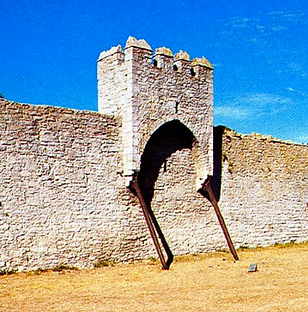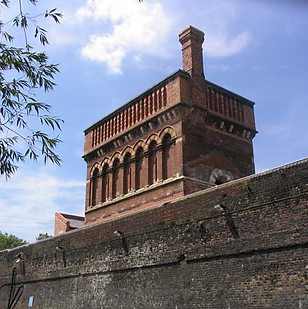
MSc Research Papers
Overview & Summaries
All research papers were written for the completion of my MSc Sustainable Building degree at for the Welsh School of Architecture at Cardiff University.
Tutors /
Dr. Oriel Prizeman & Chris Whitman
School /
Welsh School of Architecture
Year /
2017

EVOLUTION OF CONSERVATION PRINCIPLES
A focus on the following three main ideas listed below, all stemming from Ruskin’s Lamp of Memory, and how they were reinforced and evolved by William Morris, the founding father of The Society for the Protection of Ancient Buildings (SPAB); Cesare Brandi with his Teoria del Restauro (1963); Osbert Lancaster with his ‘What should we preserve’ in 1976; the Japanese traditional practice of kintsugi.
APPLICATION OF ICOMOS EDUCATION AND TRAINING GUIDELINES
The following essay identifies and discusses which points of the Guidelines were followed by the restoration of the Waterpoint Tower, considering the controversial decision to cut the tower into three sections and relocate it onto a replica plinth.

ENERGY USE IN HISTORIC BUILDINGS
An illustrated project report addressing the refurbishment of an existing historic building of my choice: the Singapore Shophouse. Part one of the report includes an analysis of the buildings climate, location, orientation, and current condition or state of repair, with manual calculations of u-values and with the aid of software (WUFI). Part two briefly outlines the hypothetical occupant’s energy use and current sources of energy with considerations of possible transformation of the building’s energy consumption through amendments to its services or energy sources.


A HISTORICAL ACCOUNT OF HILLFORTS & CAUSEWAYED ENCLOSURES OF ENGLAND AND WALES
A thematic resource for the topic of hillforts and causewayed enclosures in Britain, particularly Wales and the Vale of Glamorgan. Beginning with the definitions and explanations of the distinguishable characteristics of causewayed enclosures and hillforts.
A CONSERVATION PLAN FOR HILLFORTS & CAUSEWAYED ENCLOSURES OF THE VALE OF GLAMORGAN
Based on the research of hillforts and causewayed enclosures, and establishing the significance of these man-made structures, research was done to determine a way in which to possibly conserve the enclosures for future generations. With reference to HLF Guidelines the brief asked to prepare a detailed contribution towards a Conservation Management Plan for an aspect of the strategic protection of the Glamorgan defensive structures – focusing solely on one structure, or a group. As a student we were challenged to determine our philosophical stance on conservation and devise and defend our reasoning for our own personal approaches.
The structure of this paper is based on a Construction Management Plan, but is not a CMP - only consists of around 4,000 words in total.


DESKTOP STUDY: MORTARS WITHIN THE UK
A critical summary of current repair techniques for mortars found within the UK, including an analysis of binders according to their strength, permeability, hydraulic properties: non-hydraulic lime, hydraulic lime, natural Roman cements, and artificial cement – Portland Cement (OPC). In addition, a mention of how aggregates affect the overall performance of mortars influenced by the size, type, shape, and condition of the granular materials such as sand, gravel, and crushed stone, to name a few.

'REGIONALISM OF LIBERATION' AND 'REGIONALISM OF RESTRICTION'
Abstract: An architectural concept that has continuously been discussed and defined is regionalism, its similarities and differences to the vernacular or the more recently coined ideology of critical regionalism. Since the start of the 20th century to current day practice it has deliberately been employed to combat the monotony of modernity, serving as a vehicle to give regions or groups of people an identity and a closer connection to their surroundings and culture. Because there have been several attempts at distinguishing mind-sets and establishing a “spirit of place” it has resulted in various opinions towards the concept.
